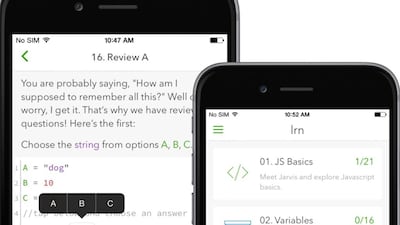Lrn is a mobile app for Apple devices that provides an introduction to coding. Once you’ve signed up for free, you can choose between five programming languages, and you are given a series of bite-size lessons. These take the form of explanations followed by multiple-choice or fill-in-the-blank questions; you don’t get to experiment with any coding yourself.
I chose JavaScript, and although the first few pages were laughably easy, explaining, for example, that “code is what computer programs are written in, the same way that words are what books are composed of”, things quickly became more challenging, and I felt I was digesting a surprising amount for such a simple learning model.
After the first four lessons, I was asked to pay £2.29 (Dh10) to unlock the rest of the JavaScript lessons, or £4.99 to unlock courses in all five languages.
Lrn has a very clean design, well-written instructions, and provides a smooth user experience. Best of all, you can download the lessons while you have access to Wi-Fi, and then do the exercises offline – an excellent use of dead time spent in the back of a car or waiting in line at the shops.
Of course, there are limitations to the model too. As you don’t get to try your own code, the app is only intended to be an introduction to the ideas and structures underlying programming languages. This can be very useful, Lrn’s founders say, for people who work with developers, like start-up chief executives, who need to be able to communicate and collaborate effectively with their software engineers without stumbling over basic terminology. It can also function as a precursor to a more in-depth course with a platform such as Codecademy or General Assembly.
Leaving these caveats aside, Lrn is a well-designed and effective educational tool, and it teaches a skill that’s soon going to be as important and ubiquitous as basic spelling, grammar and maths. Even if you’re not directly dealing with code at work, trying out Lrn is an excellent use of a few spare minutes. And an Android version is in the pipeline but it’s not out yet.
Q&A:
Who’s behind the app?
The chief executive and co-founder Nathan Bernard previously taught at Boston University’s Business Accelerator and launched a job-seeking app called Coffee in New York. His fellow co-founders are the UX designer Logan Bernard and the software engineer Chirag Jain.
What programming languages are taught?
You can choose between HTML, the most basic language of the web; CSS, which lets you style and design web pages; JavaScript, which makes pages more dynamic and interactive, and Python or Ruby, which are the most readable and multipurpose languages.
Why did they come up with it?
Mr Bernard told Business Insider that when he became a start-up founder, he found that his lack of technical programming knowledge took away from his confidence as a leader. After enjoying the experience of teaching himself to code but wanting to be able to use his subway commute to keep learning, he launched Lrn in summer 2015 with UX designer Logan Bernard and Mr Jain.
Any competitors?
Swifty is a great app in a similar style to Lrn for the iOS programming language Swift, and Khan Academy’s mobile app has free video tutorials and interactive quizzes on various aspects of programming.
What are the most popular courses?
Unlocking the complete set of JavaScript lessons is the top in-app purchase, followed by the complete set of five courses, Python lessons and Ruby lessons.
Where can I find it?
Get it at lrnapp.com or at the Apple App Store.
business@thenational.ae
Follow The National's Business section on Twitter

